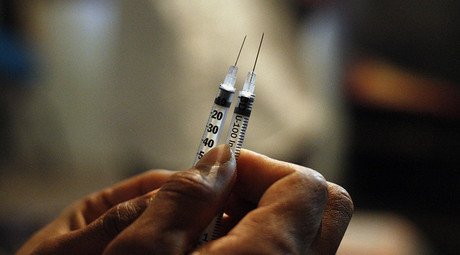Licensed to kill: Virginia seeks to protect makers of lethal drugs

Where there’s a will, there’s a way, and Virginia Republicans are applying that motto to the death penalty, pledging their support to Gov. Terry McAuliffe, a Democrat, to shield the identities of pharmacies that supply lethal injection drugs.
Gov. McAuliffe is in a difficult position these days, working across the proverbial political aisle with a Republican legislature that previously passed a controversial bill that would make death by electric chair compulsory for those facing capital punishment if lethal injection drugs were unavailable.
As an alternative, McAuliffe is attempting to conceal the identity of small-scale drug manufacturers called compound pharmacies that would allow Virginia to special order the death penalty drugs. Where the drugs would come from is a mystery as pressure from anti-capital punishment groups have resulted in a ban on exporting the necessary drugs to the US from Europe.
Delaware halts all death penalty cases as Supreme Courts weighs legalityhttps://t.co/30Qfdnp8Bspic.twitter.com/3fNW0NY8mn
— RT America (@RT_America) February 2, 2016
The lack of transparency may be troubling to some, but it is necessary for McAuliffe’s cause.
“These manufacturers will not do business in Virginia if their identities are to be revealed,” he told the Washington Post.
This leaves prisoners with a strange decision to make. They can choose to be killed by the electric chair, which McAuliffe says is “reprehensible” and is a process where “We take human beings, we strap them into a chair, and then we flood their bodies with 1,800 volts of electricity, subjecting them to unspeakable pain until they die,” as he told reporters. Or they can choose to take a mystery drug cocktail.
When discussing the drugs that make up the death penalty cocktail, there are about three kinds: one that puts the recipient to sleep, one that causes paralysis, and then the drug that stops the heart, according to CNN. When one does not work effectively, it can create huge problems.
One example of this is Clayton D. Lockett. Lockett is known for his botched execution in April 2014 when he died of a heart attack after not receiving a full dose of deadly chemicals due to an improperly set intravenous line. Visibly writhing in pain, he died 43 minutes after the procedure began.
McAuliffe is personally anti-capital punishment. However, he clarified his position, saying, “All I’m doing today is providing a humane way to carry out capital punishment here in Virginia so we have options,” and adding, “If they do not take it up, I want to be clear, they will be ending capital punishment here in Virginia.”
But even if the amendment is ratified, there is a chance that it could create more problems for Virginia.
Professor Deborah Denno of Fordham University School of Law explained to RT, “There’s supposed to be transparency when we execute a prisoner and there certainly should be information available to an inmate who’s questioning whether or not under the Eighth Amendment a particular punishment is cruel and unusual.”
The law would limit accountability for the companies responsible for a botched executions.
As Denno explained, “It gives a free pass or free ride to any kind of pharmacy who’s creating these kind of drugs. Why would they have any incentive whatsoever to make a drug for execution purposes if they knew – and that drug was problematic, that they would never be sued?”
However, some Virginia lawmakers are unfazed by this.
“If it means the governor would kill the death penalty completely, then I would vote for the compounding pharmacy,” Richard Black (R-Loudoun) said.













